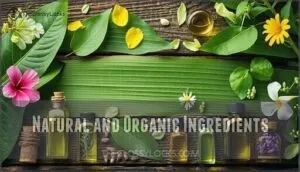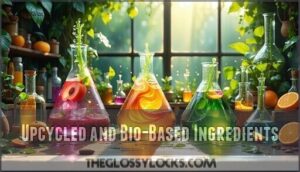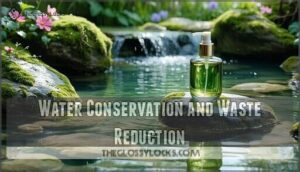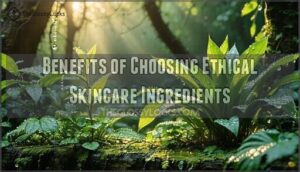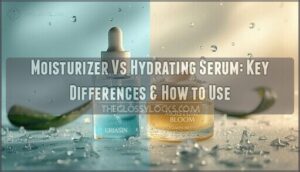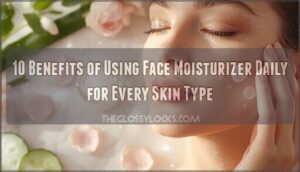This site is supported by our readers. We may earn a commission, at no cost to you, if you purchase through links.

You’re seeing more upcycled materials and water-saving formulas, all designed to shrink the carbon footprint and protect biodiversity. Regulatory changes push for honest labeling and safer formulations, making it easier for you to trust what’s in your bottle.
As science and sustainability join forces, the next chapter in ethical beauty might surprise you with even smarter, skin-friendly solutions.
Table Of Contents
- Key Takeaways
- What Drives Ethical Skincare Ingredient Trends
- Top Ethical Skincare Ingredients in 2024
- Innovative Approaches to Sustainable Skincare
- Benefits of Choosing Ethical Skincare Ingredients
- Challenges and Opportunities in Ethical Beauty
- Frequently Asked Questions (FAQs)
- Why is ethical sourcing important in cosmetics?
- Are cosmetic ingredients sustainable?
- Are organic skincare products ethical?
- What influenced the organic skincare industry?
- Are organic skin care products the future of beauty?
- What is the skin trend in 2024?
- What are the top cosmetic ingredients for 2024?
- What is the next trending ingredient in skincare?
- What is the trend in anti aging in 2024?
- How do ethical ingredients affect sensitive skin conditions?
- Conclusion
Key Takeaways
- You’re driving the demand for transparency, cruelty-free practices, and sustainable ingredient sourcing in your skincare.
- You’ve got more choices now with plant-based, upcycled, and water-saving formulas that reduce environmental impact without sacrificing effectiveness.
- You should watch for honest labeling and third-party certifications to avoid greenwashing and really trust what’s in your products.
- You’re seeing science and sustainability working together, with innovations like exosomes and bio-based ingredients leading the next wave of effective, ethical skincare.
What Drives Ethical Skincare Ingredient Trends
You’re witnessing a shift where consumer demands for transparency, environmental responsibility, and safety drive formulation choices across the skincare industry.
These trends emerge from rigorous research showing that sustainable ingredients often deliver enhanced efficacy while meeting stricter regulatory standards and addressing growing concerns about environmental impact.
Consumer Expectations and Demands
Your expectations drive the beauty industry’s transformation. In 2025, beauty brands are under increasing pressure to disclose the ingredients they use but also to demonstrate the ethical sourcing, environmental impact, and safety of those ingredients. Smart consumers demand authentic brand values that match their ethical principles.
- Ingredient Transparency – You want detailed information about what’s in your products
- Ethical Sourcing – You expect brands to source materials responsibly
- Product Efficacy – You demand formulations that actually work
- Price Sensitivity – You balance quality with affordability considerations
Sustainability and Environmental Concerns
Environmental concerns drive your skincare choices more than ever. The production and transportation of cosmetic products weigh heavily on carbon dioxide emissions. Resource depletion and biodiversity loss threaten our planet’s health. The beauty industry greatly contributes to plastic packaging waste, with billions of units produced annually.
| Environmental Concern | Beauty Industry Impact |
|---|---|
| Carbon Footprint | 120 billion plastic packaging units yearly |
| Waste Management | 95% of cosmetics packaging discarded |
| Resource Depletion | High demand for natural oils |
| Biodiversity Loss | Marine life endangerment |
| Water Pollution | Chemical runoff contamination |
Sustainable beauty answers these ethical principles.
Regulatory and Safety Considerations
Beyond environmental concerns, regulatory frameworks now shape your ingredient choices more than ever. The Modernization of Cosmetics Regulation Act requires stricter Safety Testing protocols and Ingredient Transparency across your Supply Chain.
Government Regulation demands clear Labeling Requirements, while Global Standards make ingredient safety meets health concerns. These regulatory actions protect consumers and drive ethical formulation practices industry-wide.
Top Ethical Skincare Ingredients in 2024
You want skincare ingredients that don’t just feel good, but also align with high standards for safety, sustainability, and ethics, so let’s look at what’s leading the way in 2024.
This year’s top picks highlight plant-based actives, cruelty-free production, and responsible sourcing, each supported by research and growing industry transparency.
Natural and Organic Ingredients
As ingredient sourcing becomes more ethical, you’ll find natural ingredients popping up everywhere.
Consumer demand for natural and organic options continues to shape supply chains, but not every plant or oil is created equal. Ingredient efficacy, Organic Certifications, and even formulation challenges make picking natural alternatives a science.
Remember, it takes solid know-how to truly tap into nature’s power in your routine.
Cruelty-Free and Vegan Options
If you’re scanning labels for animal welfare and Vegan Certification, you’re not alone. Ethical concerns drive consumer demand for cruelty-free, vegan options that align with ethical behavior and sustainability.
Ingredient sourcing matters—brands respond with formulas free from animal testing or byproducts. Market demand shows that consumer values are shifting, making ethical choices a top priority for skincare.
Sustainable Sourcing and Renewable Materials
If you’re looking for skincare that’s easy on the planet, sustainable sourcing and renewable materials matter. Brands now use ethical harvesting, fair trade, and bioengineered sources to minimize resource depletion.
You’ll see supply chains favoring sustainable agriculture and renewable energy. These choices help reduce biodiversity impact, making your skincare routine a part of the sustainable alternatives movement. Many brands are now using natural ingredients like aloe vera and jojoba oil.
Innovative Approaches to Sustainable Skincare
You’re seeing skincare brands use green chemistry, biotechnology, and upcycled ingredients to create formulas that are both effective and environmentally responsible.
By focusing on water conservation and waste reduction, you can choose products that champion sustainability without sacrificing results.
Green Chemistry and Biotechnology
Inside lab beakers and beyond nature’s boundaries, green chemistry and biotechnology are blending science and nature for you. Using green synthesis and enzyme technology, labs reveal high bio-actives efficacy—without harsh chemicals.
Want proof? Here’s what’s working for your skin:
- Fermentation processes
- Waste valorization
- Fresh formulations
- Sustainable alternatives from natural ingredients
Upcycled and Bio-Based Ingredients
Embracing upcycled and bio-based ingredients in your routine means supporting ingredient waste reduction and sustainable cosmetics. Leading brands repurpose fruit peels or seeds, turning leftovers into skin heroes. This circular economy beauty isn’t just trendy—it pushes real results.
Bio-based efficacy proves you can have ethical, green chemistry with effective skincare. The use of bio-based efficacy and sustainable extraction methods highlights the commitment to environmentally friendly practices.
| Upcycled Sourcing | Sustainable Extraction | Bio-Based Efficacy |
|---|---|---|
| Coffee Grounds | Cold Pressed Oils | Sugarcane Squalane |
| Fruit Peels | Enzyme-Assisted | Microalgae Lipids |
| Grape Seeds | Supercritical CO2 | Fermented Hyaluronate |
Water Conservation and Waste Reduction
If upcycled ingredients got your attention, you’ll love how ethical brands now focus on water conservation and waste reduction. It’s more than a trend—it’s a science-backed move toward minimizing environmental impact.
- Lower Water Footprint
- Smarter Ingredient Sourcing choices
- Reduced Packaging Waste
- Building the Circular Economy
- Efficient Formulations for sustainability
Small steps, big change!
Benefits of Choosing Ethical Skincare Ingredients
When you choose ethical skincare ingredients, you favor formulas that prioritize safety, transparency, and minimal environmental impact.
These ingredients often come from renewable sources, helping you maintain healthy skin while contributing to responsible industry practices.
Enhanced Skin Health and Safety
When you choose ethical skincare, you’re investing in skin barrier integrity and reduced irritation.
High-quality ingredient sourcing aids cellular regeneration and DNA repair, while maintaining microbiome balance.
These science-backed approaches help your skin adapt to environmental factors, boosting overall skin health and product safety.
Think of it as giving your skin a reliable shield, not just a beauty fix.
Reduced Environmental Impact
When you pick ethical skincare ingredients, you’re shrinking your carbon footprint and water usage, while supporting waste reduction and biodiversity impact.
Green chemistry and biodegradable formulas help cut pollution and promote environmental responsibility.
Think of it as giving the planet a spa day—sustainable practices make a real difference, both in your routine and for the world’s future.
Increased Transparency and Consumer Trust
Reducing your environmental footprint is just one piece of the puzzle. When brands prioritize Ingredient Disclosure and honest marketing, you get more than just eco-friendly formulas—you gain peace of mind.
Here’s what you should look for:
- Clear labeling with ethical and environmental claims
- Transparent supply chain and brand accountability
- Active consumer engagement to prevent greenwashing
Trust is built, not bought, and this is achieved through transparent supply chain and brand accountability.
Challenges and Opportunities in Ethical Beauty
You’ll notice that ethical beauty isn’t just about picking a product with a green label, as ingredient sourcing and certification standards can be complex.
It’s important to weigh factors like cost, accessibility, and consumer skepticism while sorting through sustainable skincare options.
Greenwashing and Consumer Skepticism
While ingredient safety boosts confidence, deceptive marketing and false claims often muddy the waters. Greenwashing is rampant, making consumer skepticism rise.
Ingredient transparency, certification integrity, and clear eco-claims matter more than ever. Here’s a quick breakdown:
| Issue | Impact | Solution |
|---|---|---|
| False Claims | Consumer trust | Certification integrity |
| Greenwashing | Confusion | Ingredient transparency |
| Ecoclaims | Skepticism | Consumer education |
Cost and Accessibility of Sustainable Options
Spotting greenwashing is one thing, but you’ll also notice price sensitivity shaping your choices. Ingredient sourcing and economic barriers can create market disparities, making ethical and sustainable options less accessible.
Brands that offer affordable alternatives without sacrificing quality gain market advantage. As consumer demands shift, your behavior influences which products remain available and which meet real sustainability goals.
The Role of Certifications and Industry Standards
You’ve seen how price can make sustainable cosmetics tricky. Now, let’s talk Certification Transparency and Standard Enforcement.
Ingredient Verification and Ethical Sourcing aren’t just buzzwords—they build Consumer Confidence.
Regulatory standards in the cosmetic industry help you spot ethical brands. When you know what those logos mean, you’re better equipped to choose products meeting ethical standards.
Frequently Asked Questions (FAQs)
Why is ethical sourcing important in cosmetics?
Did you know that over 65% of consumers now look for environmentally friendly brands?
Choosing ethically sourced cosmetics means you’re backing safer formulas, traceable origins, and fair practices—so you’re part of something bigger than a bathroom routine.
Are cosmetic ingredients sustainable?
You’ll find that not all cosmetic ingredients are sustainable, but many brands use eco-friendly sources, like plant extracts and marine actives.
Choosing products with certified, organic, or biodegradable ingredients helps protect the planet and your skin.
Are organic skincare products ethical?
Picture a farmer growing organic lavender for your moisturizer; you’re supporting eco-friendly farming, but check for fair labor and sustainable sourcing.
Organic products can be ethical, if you look beyond the label’s green promises.
What influenced the organic skincare industry?
You’re influenced by rising consumer demand for transparency, environmental concerns, and health benefits.
Shifts in scientific research, social media trends, and regulatory changes also push the organic skincare industry to prioritize safer, cleaner ingredients and address environmental concerns.
Are organic skin care products the future of beauty?
You know what they say, “the proof is in the pudding.”
Organic skin care’s future looks bright, as science backs natural ingredients for safety and efficacy, but price and accessibility will shape how quickly you’ll see widespread adoption.
What is the skin trend in 2024?
Healthy aging took center stage in 2024, with you seeing ingredients that boost collagen, protect your skin barrier, and target cell repair.
Longevity, barrier defense, and multifunctional serums are driving the skincare conversation this year.
What are the top cosmetic ingredients for 2024?
Let’s put this theory to the test: 2024’s top cosmetic ingredients are peptides for firming, exosomes for repair, niacinamide for smoothing, skin barrier boosters like ceramides, and marine algae extracts for hydration—science meets smoother, healthier skin.
What is the next trending ingredient in skincare?
Exosomes are next up in skincare—think of them as little messengers delivering repair signals to your skin cells.
You’ll notice smoother skin, better texture, and resilience that stands up to the daily grind.
What is the trend in anti aging in 2024?
You’ll notice more skincare formulas using peptides, retinoids, and exosomes in
These ingredients boost collagen and aid skin repair, helping you fend off fine lines before they set up shop on your face.
How do ethical ingredients affect sensitive skin conditions?
Dealing with sensitive skin can feel like walking a tightrope—one wrong step and irritation flares up.
Using gentle, well-sourced ingredients helps you avoid hidden irritants, so your complexion stays calm, balanced, and resilient.
Conclusion
Getting around ethical skincare ingredient trends may feel like decoding a secret language, but it’s shaping a smarter future for your routine. By choosing transparent, responsibly sourced formulations, you get skin-friendly benefits while supporting environmental progress, not just hype.
As new regulations and consumer awareness raise the bar, evidence-based, sustainable options become more accessible. Stay informed—your choices truly matter, and science-backed solutions are leading the charge in ethical skincare ingredient trends for 2025 and beyond.
- https://freeyourself.com/blogs/news/clean-skincare-brand-statistics
- https://www.insightaceanalytic.com/report/plant-based-skincare-products-market/3021
- https://www.halecosmeceuticals.com/blog/the-environmental-impact-of-skincare-routines-in-2025
- https://www.cas.org/resources/cas-insights/the-rise-of-natural-ingredients-for-cosmetics
- https://www.noviconnect.com/blog/clean-chemistry/top-5-ingredient-trends-to-watch-for-beauty-and-personal-care-right-now

